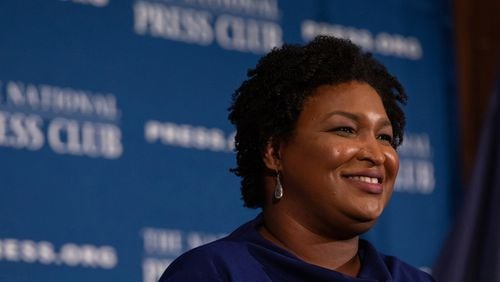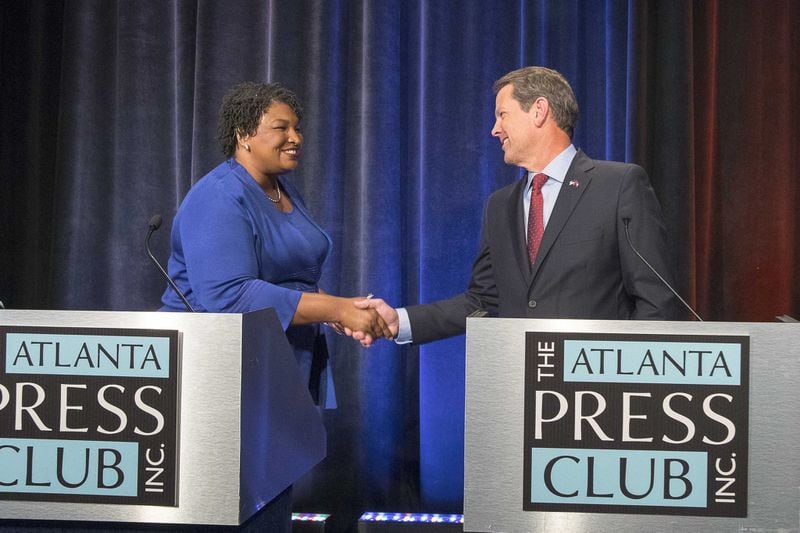SAN ANTONIO – Almost as soon as Stacey Abrams took the stage at a sold-out Tobin Center, someone in one of the front rows shouted out that she’ll be governor one day.
“We’re not starting rumors tonight,” chided the moderator of the event, a local TV personality. Abrams could only smile. She knows how quickly gossip can start about her political future every time she makes a public appearance.
The Georgia Democrat tried hard not to divulge any clues about her next steps on Monday during the first of about a dozen stops in a months-long tour that kicked off in south Texas.
But while she avoided mention of a 2022 rematch against Gov. Brian Kemp, Abrams talked plenty about her political philosophy, her critique of “BS” false equivalency in the media and why she’d “rather be in the arena” than watching from the sidelines.
Here are some of her remarks:
On her approach to identity politics:
“I can’t change what people see when they see me. What I can do is try to understand their experiences and their stereotypes … I can’t fix people. That takes way too much time and I don’t have that kind of patience. But what I can do is own who I am and be intentional.”
On dealing with harmful stereotypes:
“I was rarely called the angry Black woman. I was actually called aloof and mean because I didn’t talk to people. I’m like, I’m an introvert, we don’t talk a lot … But this is what happens when we have the audacity to own the power we have. They’re challenging it not because we don’t have it. They’re challenging it because they want it.”
On her drive to serve in public office, sparked by a childhood of volunteering:
“I made mention to my parents that I found it astounding that they thought that six little Black kids and the two of them could fix Mississippi. Who should be doing this? My parents said, ‘That’s what government is for.’ And I’m like, ‘Well, government sucks. Government is failing it’s job.’ And my parents said, ‘Well, government is people. There isn’t some omniscient being. Government is people.’
“We agree to work together and we hire people to work for us. They may not do their jobs, and when they don’t do their jobs, our responsibility is to try and shore up where they have not done their best. But it’s also our responsibility to hire better people.”
On her adventure showing cattle at a legislative competition:
“I get there, and I’m [listening] to this young man who’s is going to spend the next three hours teaching me how to show a cow. I’m like, show a cow what? The closest I’ve been to a cow was McDonald’s. He was really patient. Her name was Betsy, and she was a black angus cow … I showed my cow, and when she tried to knock me over, I was able to balance myself against her. We had a little meeting of the minds … And by the end the judge awarded me the grand champion of the legislative livestock competition.”
On preparing to run for public office in 2006:
“I wrote essays on the things that I thought were the most fundamental beliefs to make sure I believed it. It turns out there was one that I didn’t actually believe in. And that’s how I evolved on the issue of abortion. Because when I had to think about it in terms of passing laws that affected other people, it turned out my beliefs weren’t a belief, they were an opinion. And when I confronted the facts, I changed where I stood.”
Credit: Alyssa Pointer
Credit: Alyssa Pointer
On the hurtful reaction from an unnamed supporter to the news that she would run in 2018:
“When I told her that I was running for governor and asked her for investment, she said: ‘Stacey, you’re smart, you’re capable, you’d be great at this [whispering] but you’re a Black woman. I’m like, ‘I know. It’s not a terminal illness!’ But what came after was the part that devastated me …
“She had absolutely no faith that I was capable of doing this. When someone who has helped mold you tells you that you are broken clay, it’s overwhelming.”
On her willingness to raise her hand to be vice president:
“When I didn’t titter or cover my mouth and demur, or give some cloying answer, when I said affirmatively, ‘Yes I would,’ the level of angst and anger that created … I could only change that level of response by creating a new answer … It means you hear people demanding the respect and demanding the access. It matters that you know you’re not alone in this.”
On how the media can counter misinformation:
“Fair and balanced is BS. I want truth. I want you to give me an explanation and I want you to give me information. I don’t want false equivalence. I don’t want you to say, ‘I’ve set a fire. I’m putting water on it. And they’re the same.’ No. One is an arsonist and the other is the fireman…
“Please, if you take nothing else from this, do not retweet, re-copy, re-paste, re-share misinformation with your helpful description of why it’s wrong. Because the only thing people remember is the misinformation that’s being repeated.”
On why the audience should stay engaged in politics:
“The world is going to impact us one way or another. I’d rather be in the arena shaping the outcome. I’d rather be part of the doing, than a part of the done unto. You know what you need already. Voting is about making sure your voice is heard, and about shaping the vision of what we want to see.”









